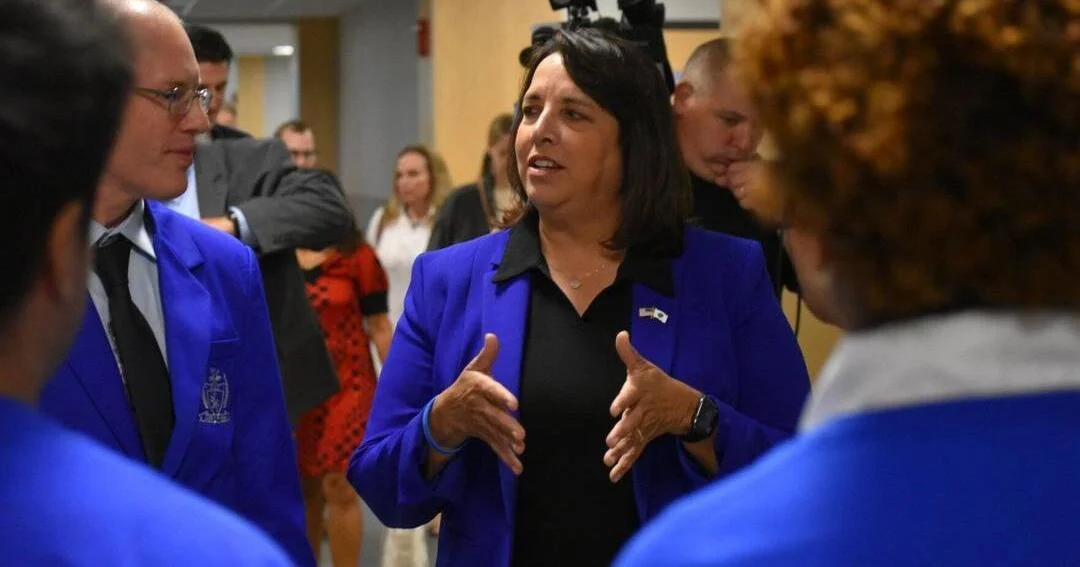‘Vision of a graduate’: Massachusetts panel releases recommendations for post-MCAS standard
By By Colin A. Young,State House News Service
Copyright berkshireeagle

ATTLEBORO — The group that’s been working since the start of the year to develop a new statewide graduation standard took its first tangible step in that direction Wednesday, releasing a “vision” of the familiar skills and attributes that a Massachusetts high school graduate should possess before they’re ready for either college or a career.
Lt. Gov. Kim Driscoll, Education Secretary Patrick Tutwiler and Elementary and Secondary Education Commissioner Pedro Martinez joined members of the Massachusetts K–12 Statewide Graduation Council and other education policy-makers to roll out the “vision of a graduate” at Attleboro High School after a tour of the school’s career technical education programs. The statement of ideals is meant to form a foundation for a statewide framework.
“We want students to feel prepared when they graduate, to take on the workforce or to feel empowered and confident in the future whatever it may be — higher ed or career pathway. This is the roadmap that we think can help us demonstrate how to do that,” Driscoll said. “And to be clear, we know this is only one step and there’s a bit of a process. And we’re in the mood of ‘go quick, but don’t hurry.'”
Gov. Maura Healey convened the group in January after voters last fall eliminated the use of the MCAS as a graduation requirement. Until the state comes up with a single new standard, the Board of Elementary and Secondary Education has adopted interim graduation requirements, including that students complete specific coursework through grade 10. Individual districts must develop and submit a local Competency Determination policy and graduation requirements to the state by Dec. 31.
The document released Wednesday envisions high school graduates as thinkers, leaders and contributors.
“A Massachusetts diploma is not just a credential; it is a launchpad for students to become effective thinkers, valued contributors, and future leaders of their communities and beyond,” the document says. “Together, these competencies not only prepare MA graduates for success in college and career, but equip them with the knowledge, skills, and dispositions to participate fully in civic life.”
Under the “thinker” banner are the ideas that graduates should be academically prepared with “a strong foundation across academic disciplines” and be creative problem-solvers who can “critically examine information to draw connections, question assumptions, infer meaning, and shape new solutions.”
The “leader” bucket envisions graduates as effective communicators who can “confidently, clearly, and respectfully express their ideas” and responsible decision-makers who “demonstrate confidence and competence in shaping their lives.” And the “contributors” label calls for graduates to “engage respectfully and productively with diverse individuals and groups” and to be “self-aware navigators” who “understand and can articulate their strengths, needs, and impact, navigating the world with curiosity and empathy.”
The “vision of a graduate” released Wednesday was the first work product of the Statewide Graduation Council. It will be followed later this year by a report of initial findings, officials said. The 31-member group is expected to issue its final recommendations by July 2026.
Tutwiler, who co-chairs the council, said Wednesday that its recommendations “will include rigorous learning experiences and a mechanism to give us confidence that all students are meeting these high expectations.”
Max Page and Deb McCarthy, president and vice president of the Massachusetts Teachers Association that pushed for the elimination of MCAS passage as a graduation requirement, said Wednesday they were glad to see the state’s vision emphasizes essential skills but warned against the continued use of a standardized test to assess students.
“Educators and voters have made clear that such essential skills cannot be assessed by a standardized test. We will only nurture students to be ‘critical problem solvers, intentional collaborators, effective communicators, self-aware navigators, and responsible decision-makers’ if we design educator-led systems of assessment and provide the necessary resources that educators, students and schools need to fulfill these goals,” the union leaders said.
A survey of recent Massachusetts high school graduates conducted in June by MassINC Polling Group found that 66 percent think the state should have one minimum graduation requirement for all high schools. Whether the standard is set at the state or local level, 74 percent said high school graduation requirements should match the minimum entrance requirements for state universities, the poll found.
The recent graduates also shared their view of what kind of learning should be a required part of graduating high school in Massachusetts. Asked an open-ended question about the most important consideration in the creation of a new standard, students said “real life skills” like financial and digital literacy, civics, and interpersonal communication (17 percent); bringing back the MCAS or another standardized test (14 percent); “the basics” like reading, math, science and history (13 percent); and workforce and college preparation like internships or community service (13 percent).
More than three-quarters of respondents, 77 percent, said they feel their Massachusetts high school education prepared them for life after graduation (29 percent very well, 48 percent somewhat well), the poll found. Most of the graduates polled, 55 percent, started college for a four-year degree the fall after their high school graduation, 23 percent started a job, and 14 percent started college for a two-year degree.
“The one thing we’ve heard time and time again is that high school students want more of a connection with what they learn during the school day and what they may encounter when they graduate from high school, whether it’s to higher education or directly to a career that interests them,” Tutwiler said Wednesday.
While Driscoll, Tutwiler and Martinez toured the high school, they moved through classrooms where students had deposited their cellphones into a communal holder at the front of the class. Students at Attleboro High School have been required since 2024 to give up their cellphones during academic time. The phones stay in a pouch while students are in class, and they have access to the devices during lunch breaks, before and after school and between classes.
The Senate has passed legislation to require schools to ban student cellphone use during the school day, an idea that Gov. Maura Healey supports.
“It’s our second year implementing that policy. And it really shows when the whole school gets behind something as a community, when we have that consistency, that we’ve noticed that it’s been successful,” Assistant Principal Kevin Gorman said when Driscoll asked about the school’s policy. “And I think kids might not always say it out loud, but they will privately say that they appreciate that.”



